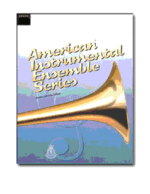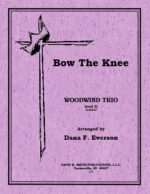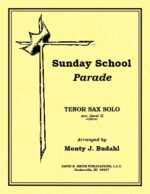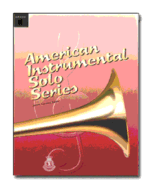-
Prelude on “Ripton”
$29.95Here is a meditative study on Sir Hubert Parry’s beloved hymn tune, “Repton.” Parry set his melody to the words of American Quaker poet John Greenleaf Whittier, and over many decades it has become a beloved hymn, particularly in the United Kingdom.
-
We Have An Anchor
$29.95This majestic arrangement is based on the well-known hymn, “We Have an Anchor.” Originally written in 1882 by Priscilla J. Owens (1829-1907), the words were set to music by William J. Kirkpatrick (1838-1921), the chorus of which reads:…
-
Going Home (Largo From New World Sym)
$29.95The Largo movement from Antonin Dvorak’s Symphony #9 titled “From the New World” has inspired various writers to give Christian words to the theme. The feel of the melody joins well together with the words by William Arms Fisher titled “Going Home.”
-
To Be Like Jesus
$29.95A sensitive setting of the chorus by General John Gowans (1934-2012) and General John Larsson (b. 1938), both of whom were one time the world leaders of The Salvation Army. Of the hundreds of lyrics General Gowans penned, this succinct chorus meant the most to him, for it was his personal mission statement:
-
All My Days
$29.95This beautiful old prayer chorus by Salvation Army officer and musician Edward Joy is well-loved by Salvationists around the world. It is a “holiness” text that speaks of submitting completely to the Lord’s will – “not a fragment, but the whole” – and the simple melody follows well the meaning and emotional content of the words. This arrangement is also purposely simple to present the song in a direct and prayerful way
-
Come, Thou Almighty King
$29.95Younger bands may find this a useful arrangement of the traditional hymn. While the statements in this simple hymn are grand, as in the lyrics “Father all glorious, Ever victorious,” the simplicity of the setting should allow the faithful to easily focus on the thoughts being expressed. The short fanfare introduction and interlude should draw attention to the invocation and praise this sturdy hymn expresses.
-
Sacrifice Of Praise
$29.95This arrangement is based on the tune “Rousseau” composed by Jean-Jacques Rousseau (1712-1778), a citizen of Geneva, Switzerland. It has been used by teachers, musicians, and film makers over the centuries to the words, “Go Tell Aunt Rhody” and other lesser-known texts.
This majestic setting features the text by Folliott S. Pierpoint (1835-1917):
-
Still With Thee
$29.95The hymnal basis for this music is a melody penned by Ira D. Sankey in 1894. It was published in 1913 in a book titled “Service Songs for Young People’s Societies, Sunday Schools and Church Prayer Meetings.”
-
The King Of Love
$29.95The 23rd Psalm is one of the most familiar passages in scripture. It is a Psalm of reassurance and comfort. This paraphrase by Henry Williams Baker (1821-1877) is familiar to us today as “The King of Love My Shepherd Is.” This arrangement presents three verses of the tune.
-
Bow The Knee
$10.50Published with multiple woodwind parts for each of the three voices plus piano. The piece begins with a rather traditional solo and then joined by an imitative second part. The piece continues in block harmonies and then breaks into contrapuntal movement. With a modulation, the parts become more ornamented. A break is then created with the piano carrying the Fl; Ob/Cl; Cl/Asx; (opt:Asax/Cl/Bssn) and pianomelodic material and then joined with the trio parts moving together producing solid harmonies. Then, in traditional fashion the piece concludes in a manner of repose.
-
Sunday School Parade
$4.50The effect of a parade coming and going… using: Jesus Loves The Little Children; Onward Christian Soldiers; I’ve Got the Joy, Joy, Joy
-
-
-
-
-
-
-
-
-
-




